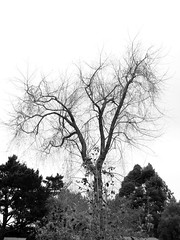For ages mankind has insisted upon classifying the world according to 'order' and 'chaos'. This however poses a big problem, since everything can be both 'order' and 'chaos' if one simply alters their perspective. In fact, the very concepts of 'order' and 'chaos' are not as well defined as entropy scientists would hope. Relatively random and chaotic things such as Brownian motion can be used as generators for extremely ordered things such as Fractals. The debate about chaotic nature of things, or the overall entropy direction of the universe is not a very worthwhile pursuit. It might be interesting, yes, but the chances of stumbling into some sort of universal truth that will stimulate your intellect in a new and exciting way are slim to none. In fact, one is likely to wind up in frustration tackling definitions and quantum mechanics.
However, being human we are able to model and fit those models to our perception of reality. If, for the sake of our model, we assume that chaos and order are somehow well defined in the most obvious way, then one we can plainly see that creativity, a chiefly intellectual concept, is nothing more than process of reorganization from chaotic to ordered and back on different perceptual and physical levels. In fact, it seems that to define art and creative works themselves, it would be easier to define things that aren't it. Mountains, planets, stars and galaxies are not what one would typically consider a creative work, yet we consider them beautiful in almost the same context as art works. Here we come upon a theological problem.
If one is a subscriber to the principles of intelligent design, then one could easily consider natural creations to be works of art. Yet, this reduces the set of things that aren't a creative work to the creator. This is obviously not a very interesting scenario, since human beings are clearly able (and will argue to death about) to discriminate between things less and more creative, artistic and beautiful. If such is a learned behaviour, a concept that flows generation to generation without having a concrete footing in anything perceived, but rather a template for all things artistic, where did it originate?
Did a hypothetical protoman Og, look up at the stars, absorbed and appraised the entropy and chaos of the cosmos, and decided that the feeling he is experiencing is, from then on, "art appreciation". Aha! We defined art and beauty, art simply being man-made beauty! Not so fast. What is the feeling that Og was experiencing? Was it some sort of biological response or just a spontaneous rush of endorphins?
Both simple and complex, ordered and chaotic, random or repeating can be beautiful. We can generalize a few rules here and there, and draw analogies, but nobody has a firm grasp on what it is. Partly because beauty is entirely subjective and varies person to person based on their individual neural development. Partly because we do not make the obvious connection between the senses. After all, food connoisseurs do not erect food galleries left and right, and we do not even have a defined concept of an olfactory affectionado, yet good tastes and pleasant smells are just as complex as concepts as beautiful sights and amazing music.
Regardless of what creativity is, any kind of re-arrangement of the ordinary into the extraordinary, be it an increase or reduction in entropy, mass or energy, is generally deemed creative. Yet, we are so incredibly attached to the concepts of artistic, original, unique and beautiful. Maybe it is wise to take a step back and reevaluate why is it so important on an intellectual level if it already gives us pleasure on a purely emotional level?
Subscribe to:
Post Comments (Atom)

No comments:
Post a Comment